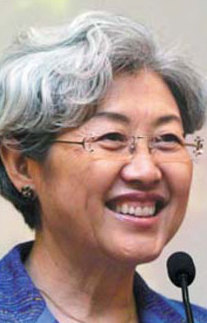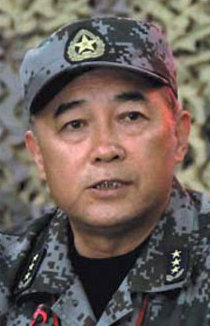Foreign and Military Affairs
Navigation in South China Sea 'not a problem'
By Li Xiaokun (China Daily)
Updated: 2010-10-23 07:20
 |
Large Medium Small |
|
|
BEIJING - A high-ranking Chinese military officer has responded to Washington's demand for more involvement in the South China Sea to ensure navigation, by saying that freedom of navigation is never a problem in that region.
| ||||
Ma said: "There is no big problem. I don't think some countries repeatedly insisting that there's a problem will contribute to regional security and stability," in answer to a question from the floor.
"We agree that the South China Sea is an important passageway and that maintaining freedom of navigation there is in the interest of many countries."
China, Vietnam, Malaysia, the Philippines and Brunei have competing claims in the South China Sea.
Ma's remarks in fact came two weeks after US Defense Secretary Robert Gates said at an international meeting in Hanoi, Vietnam, that the US has a stake in disputes in that area because of international commerce.
US Secretary of State Hillary Clinton also said back in July that sovereignty issues in the South China Sea were a "diplomatic priority" for Washington and proposed dealing with them at the international level.
China's Vice-Foreign Minister Fu Ying, who addressed the forum on Friday, said she had noticed the traditional big powers' anxieties over rising nations, at international meetings.
Fu quoted the New York Times as saying that China "has become a convenient scapegoat, it seems all problems originate from China".
 Fu ying is vice-minister of foreign affairs. |
Wang Hanling, a specialist in maritime law at the Chinese Academy of Social Sciences, said that China has never interfered in the normal activities of any ship crossing the South China Sea or any aircraft flying over it, especially those for commercial use.
"What the US calls 'national interest' is not freedom of navigation but rather its presence in the Western Pacific, or military superiority and political influence, to be more specific," Wang elaborated.
"A shift from the previous low-profile approach actually is at the core of the Obama administration's Asia-Pacific strategy."
Liu Jiangyong, an Asia-Pacific studies specialist at Beijing's Tsinghua University, said he didn't see any sense in people worrying about or interfering in matters that didn't concern them.
"It's like what General Ma said about unwarranted worries possibly having a negative impact. I'm afraid this just gives some ill-intentioned person a chance to intervene in regional affairs."
Major General ANM Muniruzzaman, head of the Bangladesh Institute of Peace and Security Studies, told China Daily that he was worried about the possibility that China's claim to "core interests" in the South China Sea conflicts with the claims of the US about "national strategic interests".
Wang Chenyan contributed to the story.












